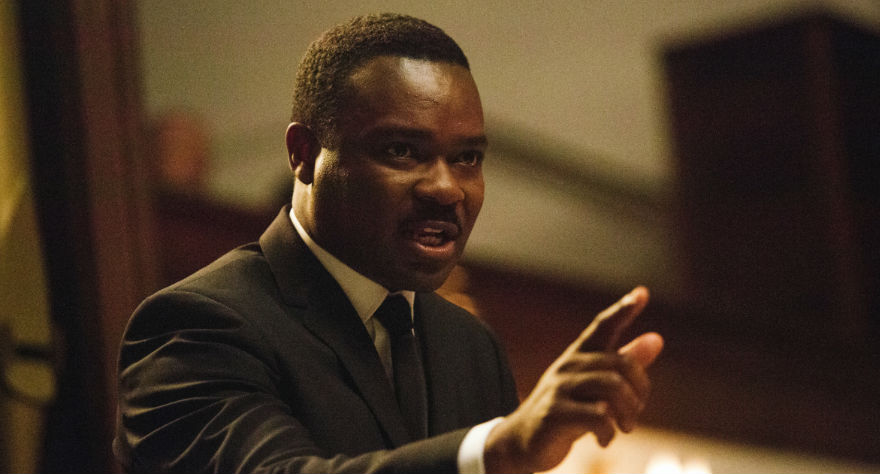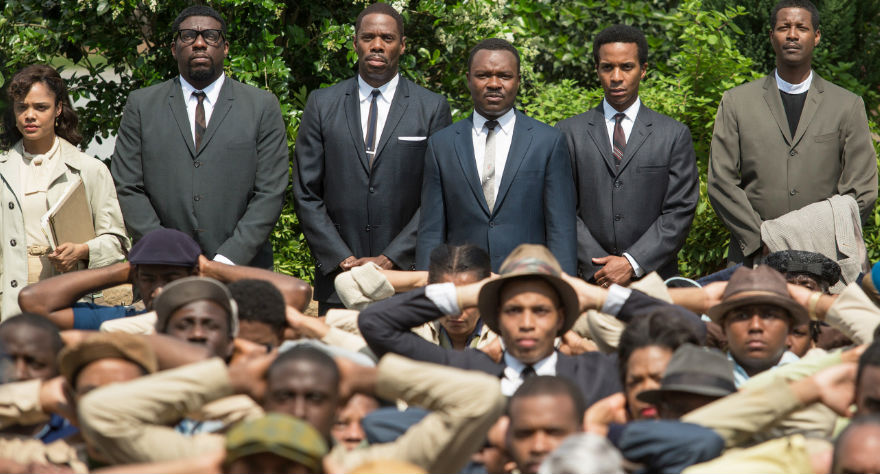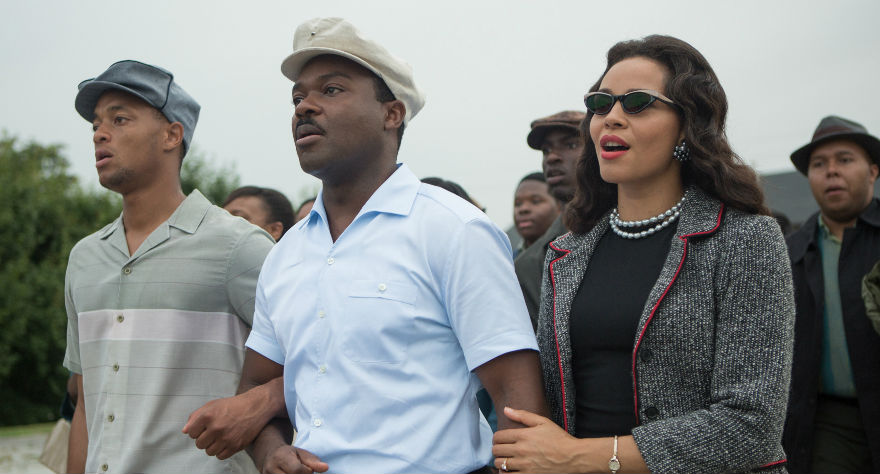David Oyelowo on Selma, MLK the Man, Not the Icon

Entering this awards season discussion late in the game is David Oyelowo, whose career-defining performance as Martin Luther King Jr. in Ava DuVernay‘s ’60s-set drama Selma seems to be turning more and more heads each day as we inch closer and closer to the Oscars. Hopefully for the English actor (who in 2014 also made appearances in Interstellar and A Most Violent Year), the film’s rave-train will hit maximum velocity come Oscar night, and he’ll walk away holding a shiny new statue. (DuVernay has arguably better chances, but the efforts of both actor and director are equally worthy.) The film opened in New York and Los Angeles on Christmas, and rolls out wide this Friday. I sincerely recommend you shell out the dough to see what all the excitement is about. You won’t be disappointed.
The film takes place over a 3-month period in Selma, Alabama, and follows Dr. King as he rallies his followers to march through the small town to accelerate the emergence of the Voting Rights Act as well as amend its preliminarily shoddy implementation. What heightens the film is its treatment of King as a character: We see him vulnerable and torn as his home life hangs precariously in the balance in the dangerous climate of his civil rights crusade. Oyelowo’s sensitivity and willingness to act with his mouth shut (this is a quieter Dr. King than we’ve ever seen on screen) is easily some of the strongest work turned in by any actor this past year. The film also stars Carmen Ejogo, Oprah, Tim Roth, and Tom Wilkinson.
I caught up with Oyelowo during his visit to San Francisco the day after a screening of the film at the Castro Theatre with DuVernay and Oprah (who also produced the film). In a roundtable interview, we talked to Oyelowo about not being able to use King’s famous speeches; approaching Dr. King as a man, not an icon; the process of adopting King’s verbal delivery; what he brings to the role as an Englishman; the original Lee Daniels incarnation of the project; the use of silence in his performance; the current shift of Hollywood toward black stories, and more.

Yesterday at the Q&A, you mentioned that it was difficult to get the rights to Martin Luther King’s speeches.
Steven Spielberg has the rights to the speeches. Oprah was beaten to the punch by him. [laughs] Not for lack of trying, by the way; we tried. But I’m hugely relieved that we didn’t, because the last thing I want as an actor playing Dr. King is people comparing and contrasting word-for-word speeches that he had given. At the end of the day, what we felt we had to do was express the spirit of this man and the facts of what went down, but not feel like we had to do an impersonation or beat-by-beat account of those speeches. In all honesty, because the speeches [in the film] were written in the rhythms and in the cadence and in the spirit of Dr. King’s speeches, it meant we were able to tie the speeches to the narrative that we were weaving rather than have things in there that didn’t really chime with the film. It ended up working out great, I think.
You play Dr. King with such vulnerability, which is something we don’t really get to see when he’s depicted in other works. How integral was that?
It was absolutely necessitous, I think. This is a historical figure around whom copious amounts of documentaries and books and specials and TV films…there’s a lot out there. But the one thing, in my research, that they don’t have as much of is who the man was behind the speeches, behind the iconography, behind the holiday that is named after him. In many ways, why make a movie if it’s not going to be revelatory? It’s just going to be stuff that you find in a documentary, so go watch a documentary. I was more interested in–and thankfully, Ava was more interested in–who the guy is at home with his wife, taking out the trash, putting his kids to bed, having doubt, fear, shame, guilt. What was he like as a husband? A friend? A father? These are all things that evoke universal truths so that we as an audience can get into the film.
What was the process of you nailing Dr. King’s voice, his cadence, his accent…It’s done very well.
It was a layered approach. There are a lot of recordings, and part of my job as an actor is to understand the musicality of how we speak. Doing accents is something I love to do; I barely do films in my own accent now! [laughs] I think I’d be thrown if I had to play an Englishman. I also worked with an incredible dialect coach named Elizabeth Himelstien, who works with me on all my films where I have an American accent. I had this incredible journey towards doing this film. In 2007, I felt called by God to do this. I had this visceral reaction when I read this script.
What went on to happen in terms of my career felt like I was taking on this divine journey of a history lesson through movies. I did Lincoln, and you have the Civil War and I’m doing a scene with Daniel Day Lewis as a soldier asking for the vote. I did Red Tails, which is about fighter pilots in the second World War who were marginalized because they were black, had the best bomber support record in the entire war, but came back to segregation in America. I did The Butler, which goes through 82 years of civil rights history, playing an activist. I did The Help, in which I play a preacher in a pulpit in Greenwood, Mississippi. Those films were all in the DNA of what [led] me to do this film. I kind of felt like all those years I was gleaning things along the way.
What do you, as a non-American person, bring to these roles that’s unique from what an American actor could bring?
I know that the director who originally cast me, Lee Daniels, said, of everyone who came in to read this role, you’re the only one who’s come in without any reverence or weight of, “I’m coming in to play Dr. King”. That’s because, even though I’ve admired him in my childhood, I didn’t grow up like a lot of African-Americans did, in their grandmother’s house with a photograph of Jesus, JFK, and Martin Luther King. I haven’t grown up with the deification of him, with “Saint King”, as part of my upbringing. I very much approached him as a man first. I think that’s what I’m able to bring. That’s the thing we wanted this film to have: the man behind all of that. I think being a foreigner helped me get there quicker.
Do you see him as a saint now?
[laughs] I see him as a saintly human being. I think that showing how human he really was in many ways elevates what he did. He did it in spite of being like us, which really makes me examine my own life. I find myself going, “What am I doing?” I’m the exact same age as he was, and I’m not changing the world. It really makes you examine your role in the shifts that are needed for humanity to continue to improve and grow. My admiration for him has now transcended the iconography. He’d been reduced to “I have a dream.” A phrase, really. You can’t really plug into that. I hope the film makes people appreciate who he was and what he did.
You were already cast in the previous version of this film, the Lee Daniels version. Was that version any different from what the film is now?
The project has differed, but it doesn’t necessarily have to do with Lee. The original script, as written by Paul Webb, was more focused on LBJ. King was not the focal point. When Ava came onboard, she felt very strongly that it should be about King and the movement. The man and the movement. In terms of Lee, I think what happened there is that we hadn’t yet had the moment that The Butler and 12 Years a Slave gave us. You have two films with black protagonists as the driving force which did very well at the box office. I truly believe one of the resistances to this film in the time that I had been aware of it was this notion that, “Well, if it’s a black lead, what does that mean for foreign [markets]? If it’s King, who was 36 at the time, it can’t be Denzel, it can’t be Will Smith, so that means it’s going to be some unknown actor. Do people really want to see a King movie?” There were all these questions which kind of seem ridiculous now when you see how immediate and necessitous I think the film is. That’s what we were suffering under the weight of until those [two] undeniable successes came along.

I’m guessing the decision to shift the view from LBJ to MLK was made prior to 12 Years a Slave.
It was, because Ava was already onboard by then. It was a beautiful synergy of circumstances. Those films came out, and we were off to the races. Up until then, it was a struggle. That’s why I asked Oprah to come onboard. Despite Ava’s brilliant work, I could feel we were segueing again into, “Okay, can we make it for this budget? What does that mean for this?” She came on and she was like, “Okay guys, this is what’s happening. Let’s do it!”
You mentioned at the Q&A that you brought on Ava after Lee dropped out. How easy or difficult was it to get that process going?
It wasn’t easy, because the film that we had done before we went on to do Selma was a $200,000 movie. This is a $20 million movie, and almost never do you get that with black directors. You never get that with black female directors. I went in and tub-thumped on her behalf, and thankfully her film Middle of Nowhere is very persuasive in terms of it being a great film, and that’s what broke the deadlock.
You talk about the musicality of King’s voice, but there’s a pivotal scene in the film in which Carmen is giving you yes-or-no questions, and you actually say very little. Talk about the silent moments in your performance.
That’s one of Ava’s gifts, her ability to tell as much story through silences and human behavior as through the spoken word. It’s something I very much gravitate towards as an actor. I think acting is reacting at its richest and most true. Also, I think we’re watching a film about a great orator; how interesting to see how he is when he’s not doing that. When this very strong woman whom he married, who actually introduced him to civil rights, is talking to him…I love that scene. I think it is the ultimate “behind the veil” scene. It is truly revelatory and I love that we go against the thing that King is known for, which is talking, and we see him being.
You’ve been in the industry for a while now. How have you seen the landscape of Hollywood change for people of color?
What’s happening now is that, for people of color in film, we’re making a shift. Selma, 12 Years a Slave, The Butler, Fruitvale Station–these are films whereby a white protagonist isn’t crowbarred into the center of it to tell a black story. I think that that has been a tradition that has long existed in Hollywood at the highest level, and it’s become a self-fulfilling prophecy: Of course those films do well, because the story is interesting, but we’re not following the right people. You set up an obstacle; how does the central character overcome it? What’s often happened is, you set up an obstacle, and suddenly this white person comes along and helps the black person through it. I feel that tolerance for that has dropped, from people like me, actors, producers, directors…and I think financiers now have a comfort level where they will now support people of color being in the driver’s seat of their own stories, because those films [that I mentioned] are doing well. That is something I’ve hoped to see, and I think that literally in the past 12 months we’ve seen a shift.
